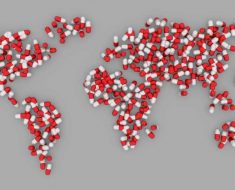Only certain body fluids, including semen, blood, vaginal fluids, and breast milk, can carry HIV.
Transmission can occur when these fluids come into contact with a mucous membrane, such as those inside the rectum, vagina, and mouth, and those on the penis.
This article explores the factors affecting the survival time of HIV outside of the body, as well as how HIV can and cannot spread.
HIV survival time outside the body

There is no set time, but in certain conditions, the virus may survive for several weeks.
This is because many factors influence its survival, including:
- the type and amount of body fluid that the virus is in
- the temperature of the environment
- the acidity of the surrounding environment
- whether there is exposure to sunlight
- environmental humidity

It is not possible to transmit or contract HIV from the following:
- mosquito and tick bites
- sexual activities that do not involve the exchange of body fluids, such as mutual masturbation
- the saliva, tears, or sweat of a person with HIV
- hugging, shaking hands with, or closed-mouth kissing a person with HIV
- sharing toilets or cutlery with a person who has HIV
- using public swimming baths
Summary
Although HIV can survive for a short time in fluids outside the body, Aidsmap say that there are no cases of a person contracting HIV after coming into contact with spillages of blood, semen, or other body fluids.
Certain activities can, however, increase a person’s risk of contracting HIV. A person can significantly reduce this risk by practicing safe sex and avoiding sharing needles.
Source: Read Full Article





